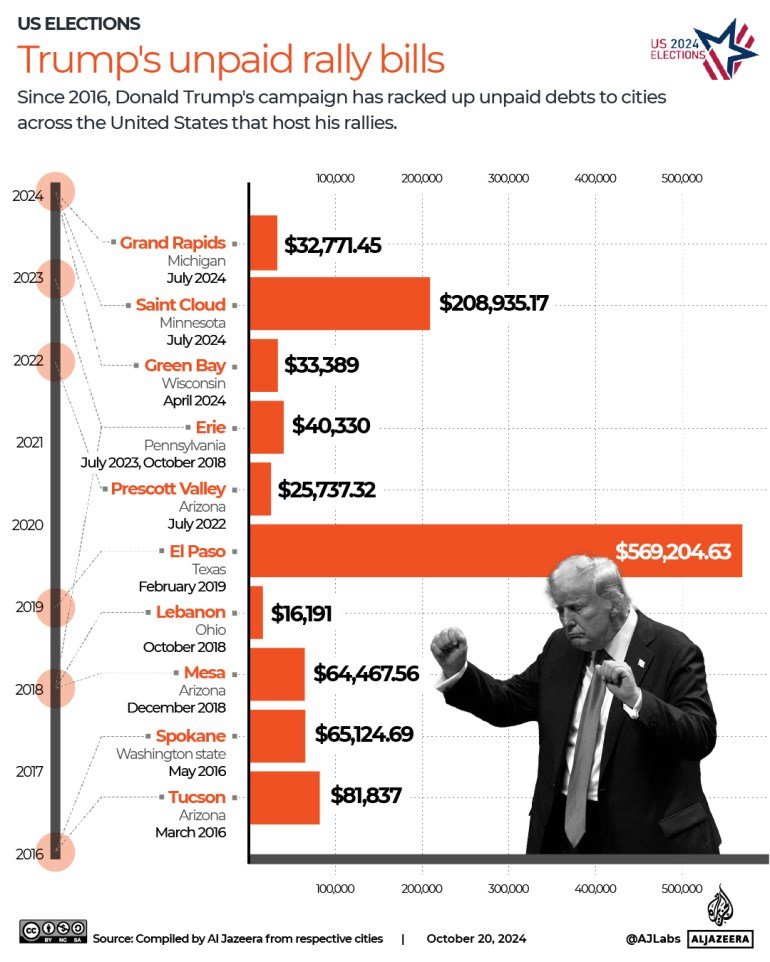Trump's Financial Woes and Impending Electoral Challenge: A Closer Look
Source: USA Zine
As the 2024 United States presidential election approaches, Republican candidate Donald Trump finds himself grappling with mounting financial obligations related to his ongoing campaign, previous electoral efforts, and business dealings. These financial strains intensify as Trump prepares to face Democratic challenger Kamala Harris, who has gained momentum in recent polls. According to a Marist survey released on Wednesday, Harris holds a narrow lead over Trump, with a five-point advantage, echoing results from other prominent polls such as the Morning Consult and the Economist/YouGov.
In a significant milestone, Harris recently surpassed billion in fundraising—a feat that underscores her campaign’s robust financial backing. Notably, over the past three months, Harris has raised nearly double the amount accumulated by the Trump campaign. The Trump campaign is currently experiencing a notable shift in donor dynamics, with contributions of 0 or less accounting for less than one-third of total donations. This marks a stark contrast to the 2020 election cycle when small donations comprised nearly half of the overall contributions.
Trump’s financial predicament is further exacerbated by a growing list of unpaid bills owed to various municipalities across the nation, reflecting a concerning pattern of financial oversight that extends back to his time in the private sector. Municipalities have reported outstanding invoices for expenses incurred during his campaign rallies, highlighting the complexity of securing adequate public safety measures for such large-scale events.
For instance, Prescott Valley, Arizona, has indicated that Trump’s campaign owes ,737.32 for expenses related to a rally held in 2022. City officials assert that they have sought upfront payment for recent events to mitigate future financial liabilities. Similarly, Mesa, Arizona, reported an outstanding invoice from a 2018 rally, totaling ,477.56, relating to expenses for public safety interventions, further illustrating the financial implications for local governments.
This trend extends to other states as well, with El Paso, Texas, reporting an outstanding balance of 9,204.63 for a rally in 2019, and St. Cloud, Minnesota, detailing unmet obligations totaling 8,935.17 for a rally this past July. Moreover, Trump’s prior engagements have resulted in legal costs that have reportedly surpassed 0 million, stemming from a series of legal battles, further complicating his financial landscape.
In light of these challenges, several municipalities have adjusted their policies, requiring future campaigns to pay for services in advance to protect taxpayer interests. Interestingly, some Republican figures, including Mesa’s Mayor John Giles, have even crossed party lines to endorse candidate Harris, suggesting a potential shifting landscape within the GOP.
As Trump faces these financial and electoral challenges, the ramifications for his campaign strategy and donor relations remain to be seen. The complexities of campaign financing and local government expenses highlight the intricate tapestry of American politics, where financial responsibility and public service can sometimes fall into conflict.
#Politics #USElectionsNews

